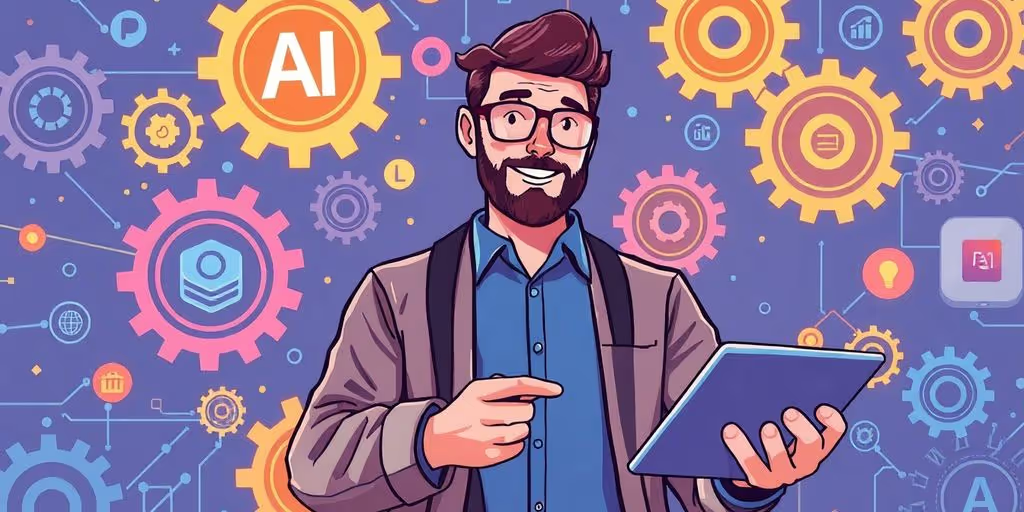"The Small Business AI Advantage: Nimbleness in Implementation"
Discover how small businesses leverage Artificial Intelligence for agility, efficiency, and competitive advantage.
In today's fast-paced business world, small companies are discovering how artificial intelligence can give them a real edge. Unlike larger corporations, small businesses can adapt quickly and implement new technologies without the heavy bureaucracy that often slows down bigger firms. This article explores how AI can be a game-changer for small enterprises, making operations smoother, cutting costs, and enhancing customer interactions.
Key Takeaways
- Small businesses can use AI to streamline operations and reduce routine tasks.
- AI helps in making better decisions by analyzing data quickly and accurately.
- Implementing AI can lead to significant cost savings and better resource management.
- The agility of small businesses allows them to adopt AI tools faster than larger companies.
- Building a data-driven culture is essential for leveraging AI effectively.
Harnessing Artificial Intelligence For Competitive Edge
Understanding AI's Role in Business
AI isn't just a buzzword anymore; it's rapidly becoming a core component of successful businesses. It's about understanding how AI can solve specific problems and create new opportunities. Think of AI as a set of tools that can analyze data, automate tasks, and even predict future trends. For example, AI can help a small business understand customer behavior better, leading to more effective marketing campaigns and improved customer service. It's about seeing AI not as a replacement for human workers, but as a way to augment their abilities and free them up to focus on more strategic tasks.
Benefits of AI for Small Enterprises
Small businesses often face unique challenges, such as limited resources and tight budgets. AI can level the playing field by providing access to capabilities that were once only available to large corporations. One of the biggest benefits is increased efficiency. AI can automate repetitive tasks, such as data entry and customer support, freeing up employees to focus on more important work. Here are some other benefits:
- Improved decision-making through data analysis
- Enhanced customer experience through personalized interactions
- Reduced operational costs through automation
AI offers small businesses a chance to innovate and compete more effectively. It's not about replacing human workers, but about empowering them with tools that can help them work smarter and faster.
Case Studies of Successful AI Implementation
Let's look at some real-world examples of how small businesses are using AI to gain a competitive edge. Consider a local bakery that uses AI-powered software to predict demand for its products. By analyzing historical sales data and external factors like weather forecasts, the bakery can optimize its production schedule and minimize waste. Another example is a small e-commerce store that uses AI-powered chatbots to provide instant customer support. These chatbots can answer common questions, resolve simple issues, and even upsell products, all without requiring human intervention. These examples show that AI can be a powerful tool for small businesses of all types.
Streamlined Operations Through AI Integration
AI isn't just a buzzword; it's a practical tool that can seriously change how small businesses operate. It's about making things smoother, faster, and more efficient. Think of it as adding a super-smart assistant to every department.
Automating Routine Tasks
Let's be real, nobody loves doing the same boring tasks day in and day out. AI can take over a lot of that stuff. Imagine not having to manually enter data, schedule appointments, or answer the same customer questions over and over. Chatbots can handle basic inquiries, freeing up your staff to focus on more complex issues. AI-powered tools can also automate invoicing, inventory management, and even social media posting. It's like having a team of robots working for you 24/7.
Here's a quick look at some tasks AI can automate:
- Data entry
- Customer service (basic inquiries)
- Social media posting
- Invoice generation
Enhancing Decision-Making Processes
Gut feelings are great, but data-backed decisions are better. AI can analyze huge amounts of data to find patterns and insights that humans might miss. This means you can make smarter choices about everything from product development to marketing campaigns. Predictive analytics, powered by AI, can forecast future trends, helping you stay ahead of the curve. It's like having a crystal ball, but based on actual numbers.
Improving Customer Engagement
AI can help you connect with your customers in a more personal and effective way. Personalized recommendations, targeted marketing, and proactive customer service are all possible with AI. For example, AI can analyze customer data to suggest products they might like, or identify customers who are at risk of leaving and offer them special deals. It's all about making your customers feel valued and understood.
AI isn't about replacing humans; it's about augmenting their abilities. By automating routine tasks and providing data-driven insights, AI can free up employees to focus on more creative and strategic work. This leads to a more engaged and productive workforce, which ultimately benefits the entire business.
Cost-Effective Solutions with AI Technology
Reducing Operational Costs
AI isn't just some fancy tech; it can seriously cut down on how much you're spending to run your business. Think about it: automating tasks means fewer hours billed, and smarter systems mean less waste. It's about doing more with less, and AI is the tool to make that happen.
- Automated customer service can handle a huge chunk of inquiries, freeing up your staff for more complex issues.
- AI-powered inventory management can predict demand, so you're not overstocking or running out of essentials.
- Predictive maintenance on equipment can prevent costly breakdowns and extend the life of your assets.
I remember when we first looked at AI solutions, I was skeptical. But after seeing how much time and money we saved by automating our email marketing, I was sold. It's not about replacing people; it's about letting them focus on what they do best.
Maximizing Resource Allocation
It's not just about cutting costs; it's about using what you have better. AI can analyze data to figure out where your resources are best spent. Are you putting too much into a marketing campaign that's not working? Is there a way to streamline your supply chain? AI can tell you. For example, you can use AI tools to enhance efficiency for small businesses.
- AI can analyze sales data to identify your most profitable products or services.
- It can optimize your staffing levels based on predicted demand.
- AI can even help you identify areas where you're overspending on energy or other utilities.
Leveraging AI for Marketing Efficiency
Marketing can be a black hole for money if you're not careful. AI can help you target your ideal customers, personalize your messaging, and track your results, so you know exactly what's working and what's not. This means no more wasted ad spend.
Agility in Adopting New AI Tools

It's a fast-moving world out there, especially when it comes to AI. What's hot today might be old news tomorrow. For small businesses, this means being able to jump on new AI tools quickly is super important. It's not just about having the latest tech, but about using it to solve real problems and get ahead.
Rapid Deployment of AI Solutions
The ability to quickly implement AI solutions can be a game-changer. Think about it: a new tool comes out that automates a big chunk of your customer service. The faster you can get that up and running, the sooner you're saving time and money. This means having a plan in place, knowing what your priorities are, and having the right people ready to go. It's about being ready to pounce when the right opportunity comes along.
Customizing AI Applications for Specific Needs
Off-the-shelf AI is great, but it's rarely a perfect fit. The real magic happens when you can tweak and tailor AI to your specific business needs. Maybe you need to train an AI model on your own data, or integrate it with your existing systems. This kind of customization can make a huge difference in how effective the AI is. It's like getting a suit tailored – it just fits better. For example, dynamic pricing strategies maximize revenue and reduce risks.
Staying Ahead of Industry Trends
Keeping up with the latest AI trends can feel like a full-time job. But it's important to at least have a general idea of what's coming down the pipeline. This doesn't mean you need to be an AI expert, but it does mean reading industry news, attending webinars, and talking to other business owners. Here are some ways to stay informed:
- Follow relevant blogs and publications.
- Attend industry conferences and events.
- Join online communities and forums.
- Experiment with new AI tools on a small scale.
The key is to be proactive, not reactive. Don't wait until everyone else is using a new AI tool – start exploring it now. Even if it doesn't pan out, you'll learn something valuable in the process. And who knows, you might just find the next big thing for your business.
Building a Data-Driven Culture with AI

Utilizing Data Analytics for Insights
Okay, so you've got AI humming along, automating tasks and making predictions. But how do you make sure everyone in your company actually uses the insights it provides? That's where building a data-driven culture comes in. It's not just about having the tools; it's about changing how people think and make decisions. Start by making data accessible to everyone. This means not burying reports in some obscure folder, but putting dashboards and key metrics front and center. Think about using a centralized dashboard that everyone can access.
- Make data easy to understand.
- Provide training on how to interpret data.
- Encourage employees to ask questions based on data.
Fostering Innovation Through AI
AI isn't just about efficiency; it's a powerful engine for innovation. But to really unlock that potential, you need to create an environment where people feel comfortable experimenting and trying new things with AI. This means encouraging employees to come up with ideas for how AI can solve problems or create new opportunities. It also means being willing to invest in those ideas, even if they don't always pan out. Think of it as a research and development lab, but with a focus on AI. It's about creating a space where people can play around with AI tools and see what they can come up with.
A great way to get started is to host internal hackathons or workshops where employees can learn about AI and brainstorm ideas. You might be surprised at what they come up with!
Training Employees for AI Proficiency
Let's be real: most people aren't AI experts. And that's okay! But if you want to build a data-driven culture, you need to give your employees the skills they need to work with AI effectively. This doesn't mean turning everyone into data scientists. Instead, focus on providing training that's relevant to their roles. For example, your marketing team might benefit from learning how to use AI-powered analytics tools, while your sales team might want to learn how to use AI to personalize customer interactions. Consider offering AI training programs tailored to different departments.
Here's a simple breakdown of training needs:
Navigating Challenges in AI Adoption
AI isn't all sunshine and rainbows; there are definitely some bumps in the road when you're trying to bring it into your small business. It's not just about picking the right tool; it's about making sure it fits, works well, and doesn't cause more problems than it solves. Let's look at some common issues and how to deal with them.
Addressing Security Concerns
Okay, so you're thinking about using AI. Great! But what about security? Data breaches are a real worry, and you need to make sure your customer info and business secrets are safe. It's not enough to just trust the AI vendor; you need to have your own security measures in place. Think about things like:
- Regular security audits.
- Employee training on data protection.
- Strong encryption for sensitive data.
- Incident response plans in case something goes wrong.
It's easy to get caught up in the excitement of new tech, but security can't be an afterthought. Make sure you're protecting your business and your customers.
Overcoming Resistance to Change
People don't always like change, especially when it involves new technology. Your employees might be worried about being replaced by AI, or they might just not want to learn a new system. The key is communication and training. Explain why you're bringing in AI, how it will help, and how it will make their jobs easier (not eliminate them). Offer training and support to help them get comfortable with the new tools.
Ensuring Ethical Use of AI
AI can be biased, unfair, or just plain weird if you're not careful. You need to think about the ethical implications of using AI in your business. Are you using it to make decisions that could discriminate against certain groups of people? Are you being transparent with your customers about how AI is being used? It's important to have guidelines and policies in place to make sure you're using AI responsibly. For example:
- Regularly audit AI systems for bias.
- Prioritize transparency with customers about AI usage.
- Establish clear ethical guidelines for AI development and deployment.
Here's a simple table to illustrate potential ethical issues:
Future-Proofing Your Business with AI
It's not enough to just adopt AI; you need to think about how to keep your business relevant as AI continues to change. It's like planting a tree – you can't just stick it in the ground and walk away. You have to nurture it, prune it, and protect it so it can grow strong and healthy. The same goes for AI; you need to actively manage its integration and evolution within your business to reap long-term rewards.
Preparing for AI Advancements
AI isn't standing still, and neither should your business. Keep an eye on the horizon for new developments. What's hot right now? Smaller, more efficient AI models are making waves, and everyone's talking about AI agents. It's a good idea to read up on these things. Don't get left behind using outdated tech. It's like using a horse and buggy when everyone else has a car.
Investing in Continuous Learning
Your team needs to keep learning about AI. It's not a one-time training thing. New tools and techniques are popping up all the time. Think about setting up regular workshops or online courses. Maybe even bring in experts to give talks. It's like keeping your car tuned up – regular maintenance keeps it running smoothly.
Collaborating with AI Experts
Sometimes, you just need a little help from the outside. Partnering with AI experts can give you a fresh perspective and access to specialized knowledge. They can help you with everything from choosing the right tools to building custom solutions. It's like hiring a contractor to build an addition to your house – they have the skills and experience to get the job done right.
It's important to remember that future-proofing isn't about predicting the future; it's about building a business that's adaptable and resilient. By staying informed, investing in learning, and collaborating with experts, you can position your company to thrive in an AI-driven world.
Here's a simple way to think about it:
- Stay informed about AI trends.
- Train your employees regularly.
- Seek expert advice when needed.
Wrapping It Up
In the end, small businesses have a real edge when it comes to using AI. They can adapt quickly, which is a big deal in today’s fast-paced world. With the right tools, these businesses can streamline their operations, improve customer service, and make smarter decisions without the heavy lifting that larger companies often face. It’s all about being agile and ready to pivot when needed. So, if you’re a small business owner, don’t hesitate to explore AI options. The sooner you start, the better positioned you’ll be to thrive in this competitive landscape.
Frequently Asked Questions
What is AI and how does it help small businesses?
AI, or artificial intelligence, is technology that helps computers think and learn like humans. For small businesses, AI can help them work faster, make better decisions, and understand their customers better.
What are the main benefits of using AI for small businesses?
Using AI can save time and money, improve customer service, and help businesses grow. It can automate boring tasks and provide insights from data that can help in making smarter choices.
Can you give an example of a small business successfully using AI?
Sure! A small online store used AI to recommend products to customers based on their shopping habits. This helped increase sales and made customers happier.
How can AI make daily operations easier for small businesses?
AI can automate tasks like answering customer questions, managing inventory, and sending reminders. This lets employees focus on more important work.
Is AI expensive for small businesses to implement?
Not necessarily! There are many affordable AI tools available. Small businesses can start with simple solutions and grow their AI use as they see benefits.
What should small businesses consider before using AI?
They should think about their goals, the type of data they have, and how ready their team is to use new technology. It's also important to consider privacy and security when using AI.








